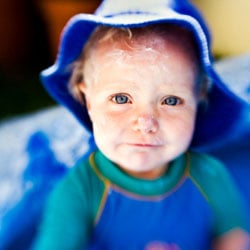
Keeping your kids happy and healthy — even during a heat wave
7 June 2012
Prevention for heat stroke in children is important when the temperature rises in the summer months. As a parent, there are many things you can do to help keep your kids happy and healthy, even during a heat wave.
Be prepared
Before heading outside, check the temperature. If the weather forecast calls for a scorcher, use your better judgment and stay indoors, where it is cooler instead. If you do not have an air conditioned home, plan a trip to a shopping mall or grocery store to keep cool.
If you must go outdoors during a very warm day, start out early before the sun is at its strongest. This will enable you and your children to enjoy the outdoors much more. The sun’s UV rays are strongest between 11 a.m. and 4 p.m.*, so during those times, it’s best to stay out of the sun completely.
If going outside at those times cannot be avoided, precautionary steps should be taken to ensure safety:
- Stay in the shade when possible;
- Keep your child hydrated with water, fruits and vegetables;
- Have your child wear breathable, light-coloured, loose clothing and a wide-brimmed hat;
- Take breaks and visit an air-conditioned place;
- Never leave a child unsupervised in your car, no matter what the temperature.
Sunscreen note:
- Sunscreen is a must when going outside in the summer. For children older than six months, it is recommended to wear a sunscreen that is 15 SPF or higher, and to reapply every two hours.*
- Children younger than six months cannot wear sunscreen and should stay shaded at all times.
- Beware – sunscreen will protect your child against harmful UV rays but not from the heat.
Sports, camp and outdoor activities
- Be attentive to your child when an outdoor activity or play date has been scheduled. Sports games are commonly held on hot summer days. Having a shaded area for children to cool down during breaks will help.
- Another good tip is to bring a cooler filled with water. If the weather is too hot to handle, reschedule! It’s a lot better to have an alternative indoor location for a sport than to have the team suffer from the heat.
Did you know?
Medication can also affect your child’s risk of heat stroke by making him or her more sensitive to the sun. If your child is prescribed medication, speak to your pediatrician and pharmacist about whether you need to take even more precautions.
Signs of distress
Look out for these signs of heat-related illness; they will help you prevent your child from developing a heat stroke:
- Lots of sweating
- Dizziness / fainting
- Extreme thirst
- Headache, nausea and/or vomiting
- Dark yellow urine and/or decreased urination
- Rapid breathing and heartbeat
- Behavioural changes such as tantrums or lethargy
Taking these precautions and watching for these signs will ensure your child is kept safe and happy during the summer months.
